新人教版必修4 Unit 4 Body language知识点课件(46张ppt)
文档属性
| 名称 | 新人教版必修4 Unit 4 Body language知识点课件(46张ppt) | 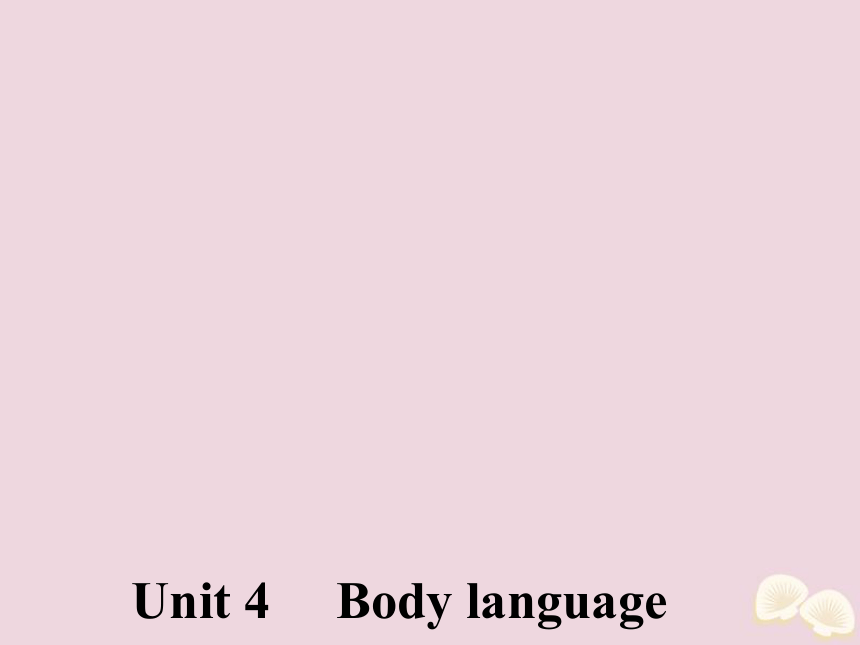 | |
| 格式 | zip | ||
| 文件大小 | 571.5KB | ||
| 资源类型 | 教案 | ||
| 版本资源 | 人教版(新课程标准) | ||
| 科目 | 英语 | ||
| 更新时间 | 2019-08-25 15:23:21 | ||
图片预览

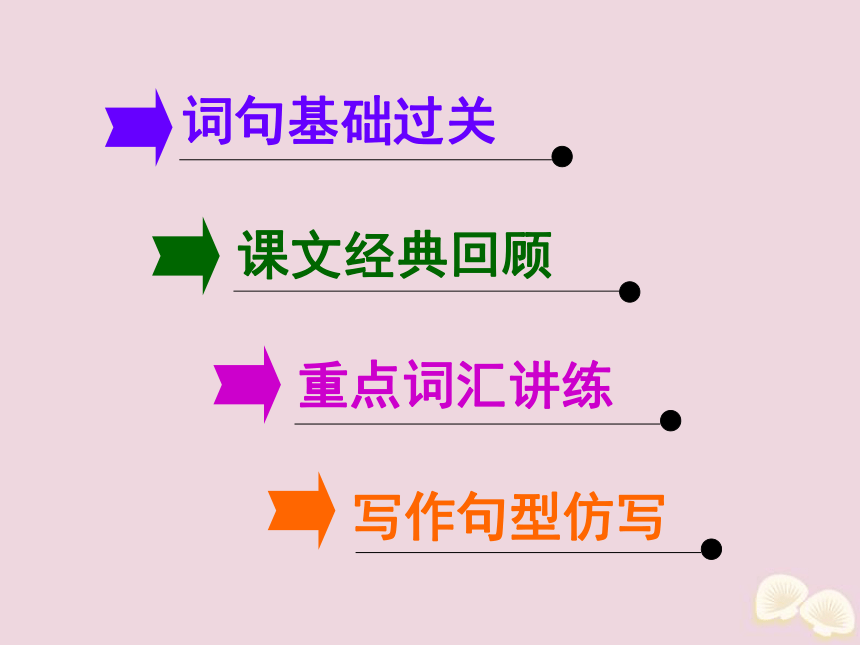

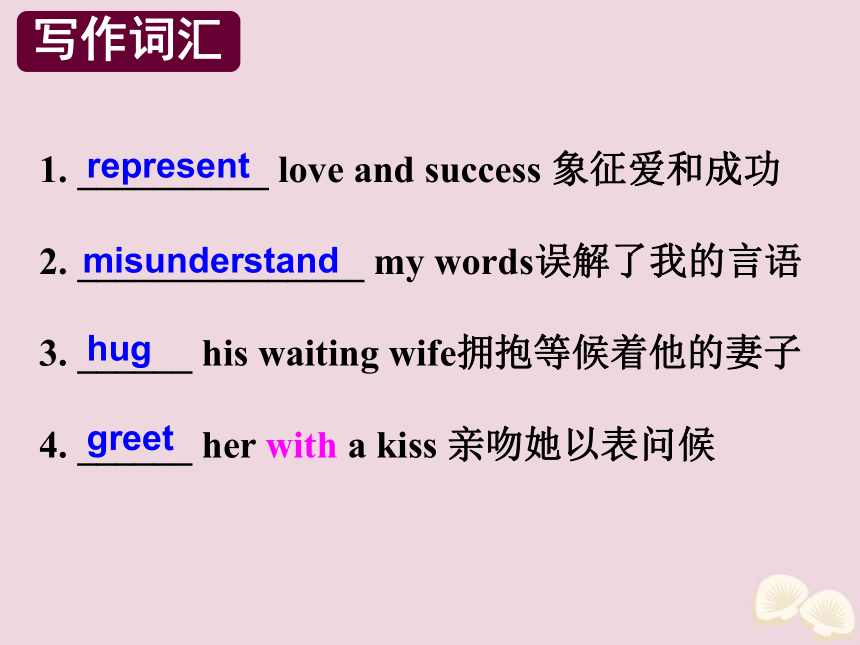
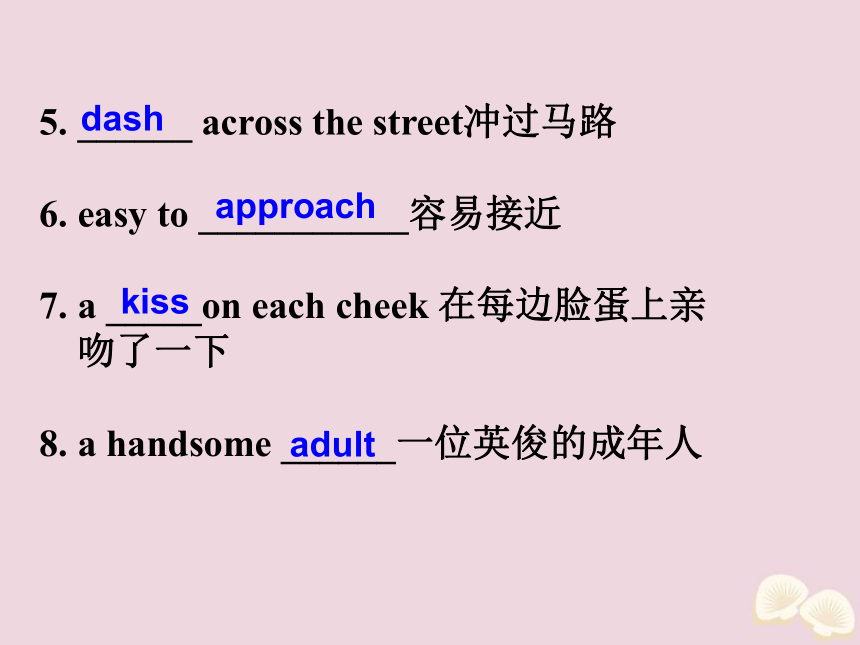
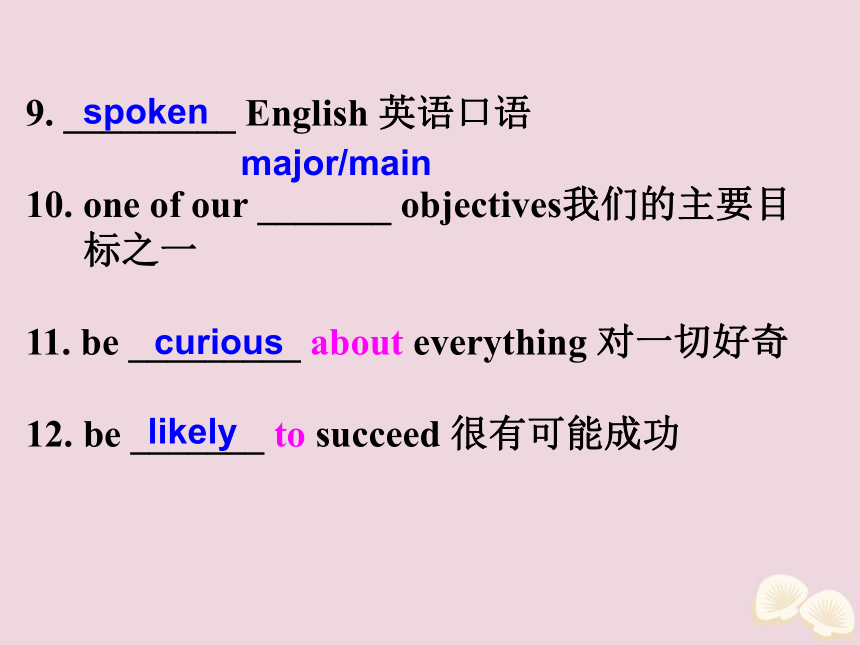
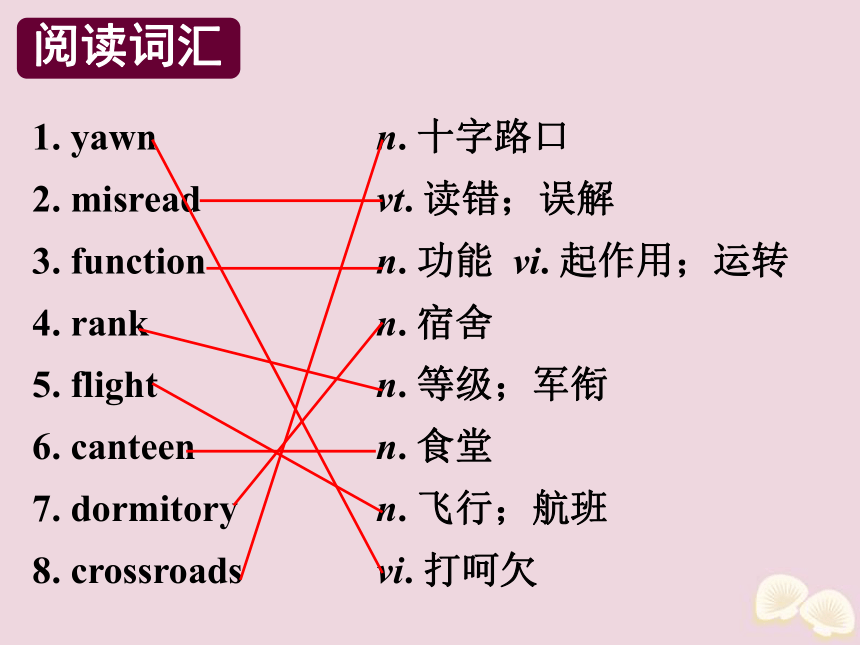
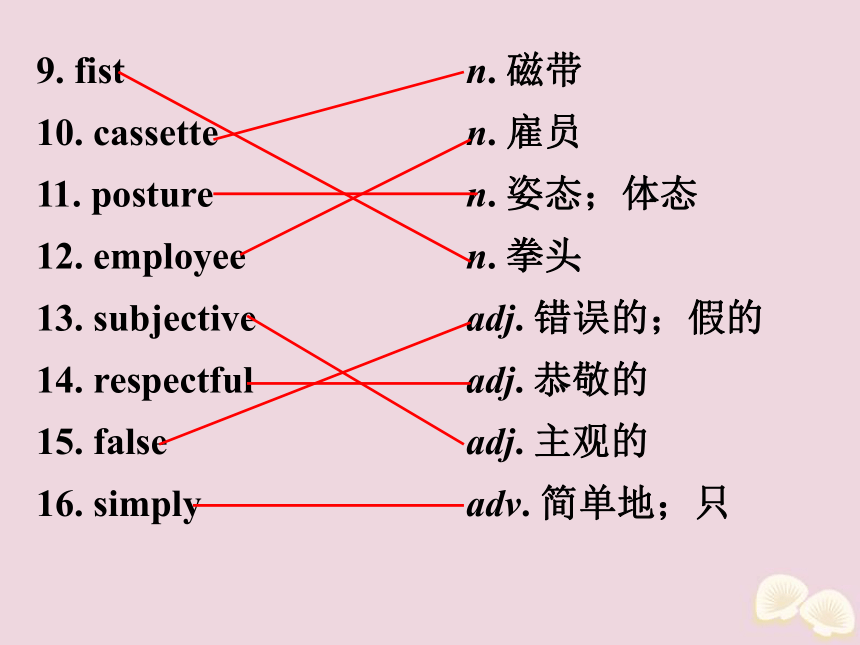
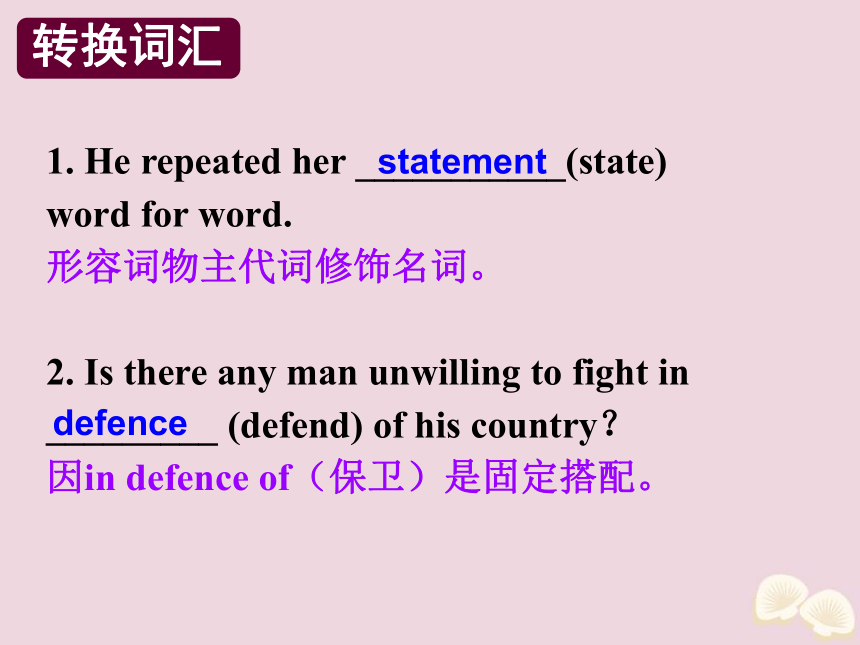
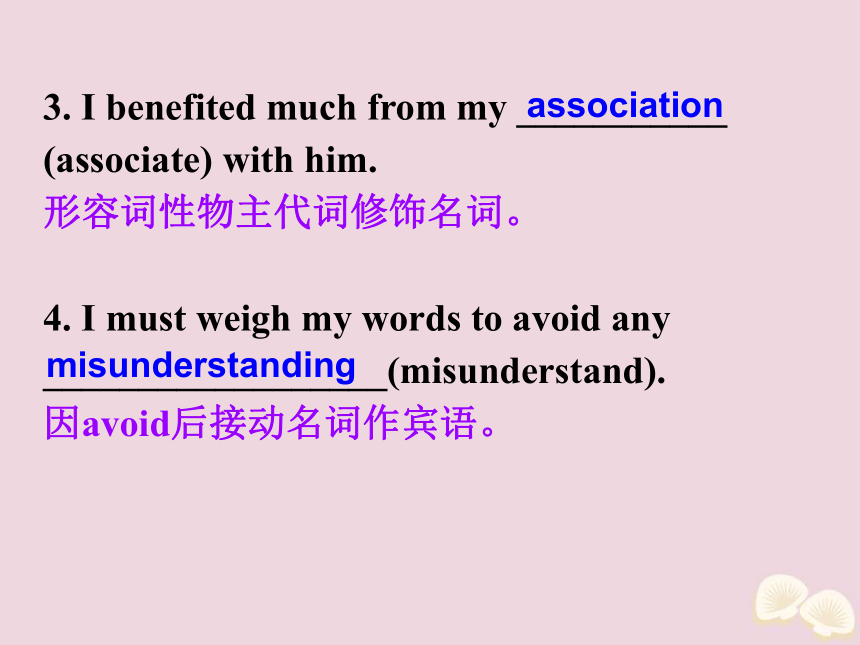
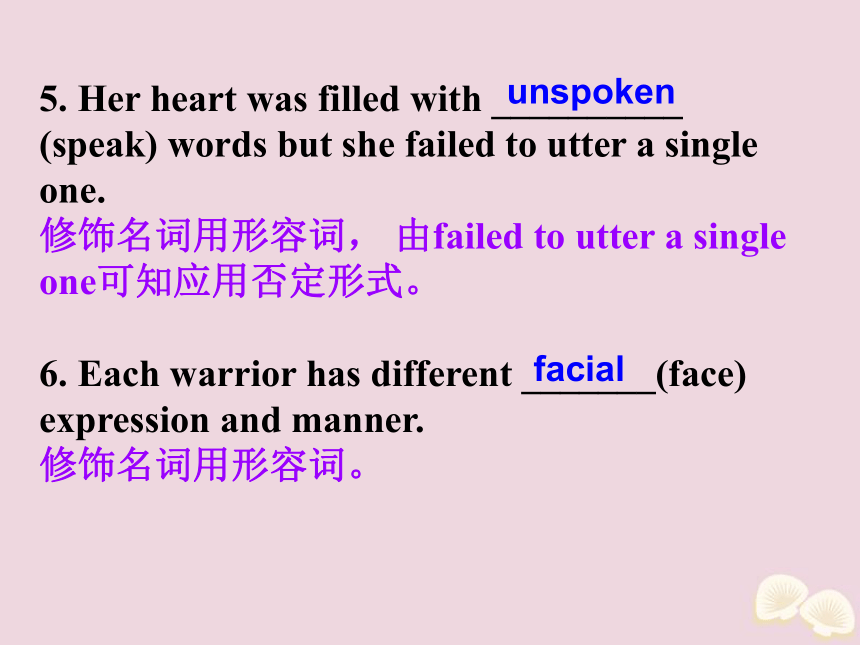
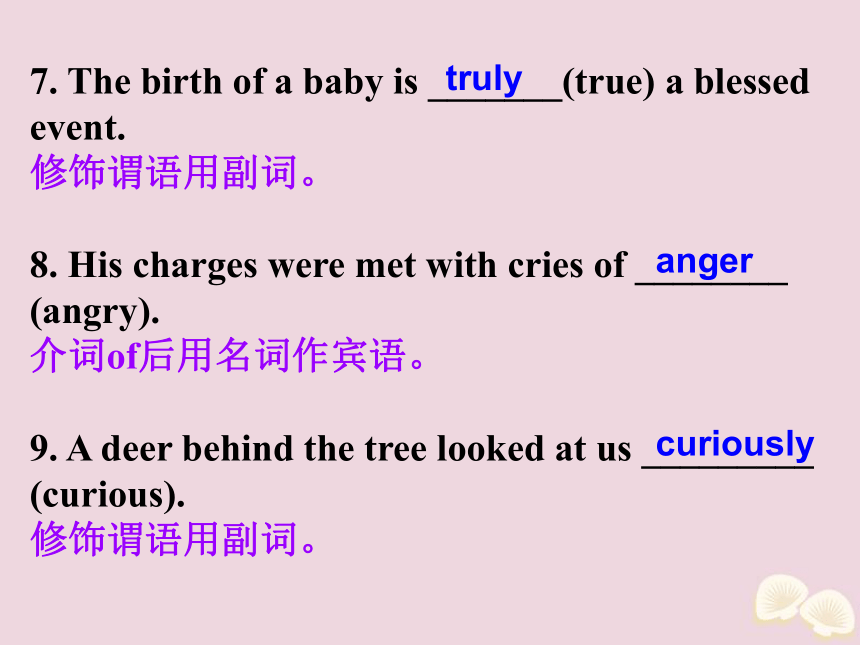
文档简介
(共46张PPT)
Unit 4 Body language
课文经典回顾
重点词汇讲练
写作句型仿写
词句基础过关
1. __________ love and success 象征爱和成功
2. _______________ my words误解了我的言语
3. ______ his waiting wife拥抱等候着他的妻子
4. ______ her with a kiss 亲吻她以表问候
greet
represent
misunderstand
hug
5. ______ across the street冲过马路
6. easy to ___________容易接近
7. a _____on each cheek 在每边脸蛋上亲
吻了一下
8. a handsome ______一位英俊的成年人
adult
dash
approach
kiss
9. _________ English 英语口语
10. one of our _______ objectives我们的主要目
标之一
11. be _________ about everything 对一切好奇
12. be _______ to succeed 很有可能成功
likely
spoken
major/main
curious
1. yawn n. 十字路口
2. misread vt. 读错;误解
3. function n. 功能 vi. 起作用;运转
4. rank n. 宿舍
5. flight n. 等级;军衔
6. canteen n. 食堂
7. dormitory n. 飞行;航班
8. crossroads vi. 打呵欠
9. fist n. 磁带
10. cassette n. 雇员
11. posture n. 姿态;体态
12. employee n. 拳头
13. subjective adj. 错误的;假的
14. respectful adj. 恭敬的
15. false adj. 主观的
16. simply adv. 简单地;只
1. He repeated her ___________(state)
word for word.
形容词物主代词修饰名词。
2. Is there any man unwilling to fight in _________ (defend) of his country?
因in defence of(保卫)是固定搭配。
statement
defence
3. I benefited much from my ___________ (associate) with him.
形容词性物主代词修饰名词。
4. I must weigh my words to avoid any __________________(misunderstand).
因avoid后接动名词作宾语。
association
misunderstanding
5. Her heart was filled with __________ (speak) words but she failed to utter a single one.
修饰名词用形容词, 由failed to utter a single one可知应用否定形式。
6. Each warrior has different _______(face) expression and manner.
修饰名词用形容词。
unspoken
facial
7. The birth of a baby is _______(true) a blessed event.
修饰谓语用副词。
8. His charges were met with cries of ________ (angry).
介词of后用名词作宾语。
9. A deer behind the tree looked at us _________ (curious).
修饰谓语用副词。
truly
anger
curiously
1. __________ 丢脸
2. ____________win the prize有希望获奖
3. __________ 总的来说;通常
4. ______________ disease 抵御疾病
5. _____ sb ________让某人舒适/不拘束
6. _________________ someone 背对某人;
背弃某人
turn one’s back to
lose face
be likely to
in general
defend against
put
at ease
1. … so it is an __________(amaze) thing that we understand each other as well as we do.……所以我们能彼此理解,这真是件令人惊奇的事啊!
amazing
2. Not all cultures greet each other the same way, _____ are they comfortable ___ the same way with touching or distance between people.各种文化背景下人们互致问候的方式不尽相同,对身体接触和相互间距离的接受程度也并不一样。
3. These actions are not good or bad, ____ are simply ways ___ which cultures have developed.这些行为不能说它好,也不能说它不好,这只是文化发展方式(不同罢了)。
nor
in
but
in
4. However,people from places like Spain,Italy or South American countries approach others closely and are more likely _________ (touch) them.不过,来自西班牙、意大利和南美国家的人会站在离别人很近的地方,而且更可能会(用身体)接触对方。
5. …, but what ___ we don’t know who the new person is? ……,但是如果我们不知道新来的那个人的名字怎么办?
if
to touch
Body language is one of the most powerful means of communication, often even more powerful than 1 ________(speak) language. People around the world show all kinds of feelings, 2 ________(wish) and attitudes that they might never speak aloud. 3 ___is possible to “read” others around us, even 4 ____ they
do not intend 5 _____ us to catch their unspoken communication. Of course, body language can
be misread, but many gestures and actions are universal.
spoken
wishes
It
if
for
The most universal 6 ______ (face) expression
is, of course, the smile—its function is to show
7 ___________(happy) and put people at ease. It does not always mean that we are 8 ______(true) happy, however. Smiles around the world can
be false, hiding other feelings like anger, fear
or worry. There 9 _____(be) unhappy smiles, such as when someone “loses face” and smiles
10 ________(hide) it. However, the general purpose of smiling is to show good feelings.
to hide
facial
happiness
truly
are
Not all cultures greet each others the same
way, nor are they comfortable in same way
with touching or distance between people. In the same way that people communicate to spoken
language, they also express his feelings using
unspoken “language” through physical distance, actions or posture.
English people, for example, do not usually stands
very close to others or touch stranger as soon as
they meet. However, people from places like Spain, Italy and South American countries approach
others closely and are more likely to touching
them. Most people around the world now greet each other by shaking a hands, and some cultures
use other greetings as well, such as the Japanese, who prefer to bow.
1. others→ other 因each other是固定词组。
2. same前加the 因same习惯上总是与the连用。
3. to→ with 因communicate with(与……交流; 用……来交流)为固定搭配。
4. his→ their 句子的主语是they,故此处相对应用their。
5. stands→ stand 因do not后接动词原形。
6. stranger→ strangers 用复数表示泛指。
7. and→ or 表示或者。
8. touching→ touch 由be likely to do sth可知to后接动词原形。
9. 删除hands前的a 因shake hands(握手),中间无冠词,应删除。
10. and→ but 前后是转折而并非并列关系。
representation n. 表现;描述;表现法
representative adj.代表的 n.代表
1. represent vt. 代表;象征
What does WTO represent? WTO代表什么?
⑴ 她代表同学们出席了这次学校会议。
She ___________________________at
the school meeting.
⑵ 我代表学校给您打电话。
______________________ to call you.
I represent our school
represented her classmates
People have always been curious about exactly how life on earth began. 人们一直对于地球生命的起源感到好奇。
2. curious adj.好奇的
curiously adv.好奇地
curiosity n.好奇心
be curious about… 对……感到好奇
be curious to do sth 渴望做某事
out of curiosity 出于好奇
meet/satisfy one’s curiosity 满足某人的好奇心
with curiosity=curiously 好奇地
John ______________(渴望) see his uncle digging a hole under the bed and he asked him about it. But the answer could not ________ _________________ (满足他的好奇心). Then, ______________(出于好奇), John _________ (好奇地) walked into his uncle’s room to find the answer when his uncle was away.
用curious的相关短语完成小短文。
curiously
was curious to
meet/
satisfy his curiosity
out of curiosity
(1) 随着考试的临近,复习课堂笔记是一
个好主意。
___________________________________
_____________, it’s a good idea to review your class notes.
3. approach v. 接近;靠近
n.接近;方法(后接to)
With exams approaching/As exams are
approaching
(2) 当你接近那座小镇, 你能在左手边看到那所学院。
______________________________, you’ll see the college on the left.
(3) 我不知道从何着手处理这个问题。
I’m not sure _________________________
____________.
how to approach/deal with
As/When you approach the town
the problem
(4) 我们将采用收集信息的不同方法。
We will adopt different approaches _____________
______________________.
(5) 通往那个村庄的路是一条古老的土路。
The approach ______________ was an old dirt road.
to gathering/
to the village
collecting information
⑴ She had to defend herself _________ the guard dog.
4. in defence (of…) 防卫;保卫
defend…from/against… 保卫……以免受……
against
⑵ The duty of a soldier is to ________________
(保卫国家).
⑶ They decided to fight ___________________
_________ (为保卫祖国).
in defence of their
defend his country
country
(1) 总的来说,女人比男人长寿。
5. in general(=generally) 总的来说;通常
as a general rule在通常情况下;一般而言
generally speaking 一般说来(作插入语)
In general (=Mostly; Usually; In most cases), women live longer than men.
(2)在通常情况下,我不看侦探小说。
As a general rule (=In most cases), I don’t read detective novels.
(3)一般来说,教师能把自己的意思表达清楚。
Generally speaking, teachers are able to communicate their ideas /express themselves clearly.
express oneself表达自己的思想或感情等
give expression to表达
6. express vt. 表达;表示 n. 快车;快递
Words can not express my feelings. 语言无法表达我的情感。
⑴ 请用特快寄这封信。
Please send this letter ____________.
⑵ 那首歌表达了人民对祖国深厚的爱。
The song __________________ the deep
love of the people for their motherland.
gives expression to
by express
7. be similar to与……相似
My experience is quite similar to yours. 我的经历与你的十分相似。
⑴ 所有的大城市都大同小异。
All big cities _________________.
⑵ 他的帽子和我的差不多。
His hat ___________________.
is similar to mine
are quite similar
他不是美国人,而是英国人。
8. not…but… 不是……而是……
She is not beautiful but honest. 她不美丽,但很诚实。
He is not an American,but an Englishman.
He doesn’t like English,nor do I. 他不喜欢英语,我也不喜欢。
1.nor/neither+助动词/情态动词/be+主语
表示前面所述的否定情况也适合于后者
⑴ 如果你不想去,我也不想去。
If you don’t want to go, _________________.
⑵ 我不喜欢住在闹市区,她也不喜欢。
I do not like living downtown_______________
_________.
⑶ 他不能做,我也不能,你也不能,任何人
都不能。
He can’t do it, _________,nor can you, ______ _____________.
can anybody
neither/nor do I
and nor/neither
does she
nor can I
nor
Don’t worry. He is likely to get in touch with you. 别担心,他很有可能会和你联系。
2. be likely to do很可能……;有希望……
⑴ 他们可能会同意你的想法。
They are likely to agree with your idea.
⑵ 很有可能会下雨。
It is likely to rain.
Unit 4 Body language
课文经典回顾
重点词汇讲练
写作句型仿写
词句基础过关
1. __________ love and success 象征爱和成功
2. _______________ my words误解了我的言语
3. ______ his waiting wife拥抱等候着他的妻子
4. ______ her with a kiss 亲吻她以表问候
greet
represent
misunderstand
hug
5. ______ across the street冲过马路
6. easy to ___________容易接近
7. a _____on each cheek 在每边脸蛋上亲
吻了一下
8. a handsome ______一位英俊的成年人
adult
dash
approach
kiss
9. _________ English 英语口语
10. one of our _______ objectives我们的主要目
标之一
11. be _________ about everything 对一切好奇
12. be _______ to succeed 很有可能成功
likely
spoken
major/main
curious
1. yawn n. 十字路口
2. misread vt. 读错;误解
3. function n. 功能 vi. 起作用;运转
4. rank n. 宿舍
5. flight n. 等级;军衔
6. canteen n. 食堂
7. dormitory n. 飞行;航班
8. crossroads vi. 打呵欠
9. fist n. 磁带
10. cassette n. 雇员
11. posture n. 姿态;体态
12. employee n. 拳头
13. subjective adj. 错误的;假的
14. respectful adj. 恭敬的
15. false adj. 主观的
16. simply adv. 简单地;只
1. He repeated her ___________(state)
word for word.
形容词物主代词修饰名词。
2. Is there any man unwilling to fight in _________ (defend) of his country?
因in defence of(保卫)是固定搭配。
statement
defence
3. I benefited much from my ___________ (associate) with him.
形容词性物主代词修饰名词。
4. I must weigh my words to avoid any __________________(misunderstand).
因avoid后接动名词作宾语。
association
misunderstanding
5. Her heart was filled with __________ (speak) words but she failed to utter a single one.
修饰名词用形容词, 由failed to utter a single one可知应用否定形式。
6. Each warrior has different _______(face) expression and manner.
修饰名词用形容词。
unspoken
facial
7. The birth of a baby is _______(true) a blessed event.
修饰谓语用副词。
8. His charges were met with cries of ________ (angry).
介词of后用名词作宾语。
9. A deer behind the tree looked at us _________ (curious).
修饰谓语用副词。
truly
anger
curiously
1. __________ 丢脸
2. ____________win the prize有希望获奖
3. __________ 总的来说;通常
4. ______________ disease 抵御疾病
5. _____ sb ________让某人舒适/不拘束
6. _________________ someone 背对某人;
背弃某人
turn one’s back to
lose face
be likely to
in general
defend against
put
at ease
1. … so it is an __________(amaze) thing that we understand each other as well as we do.……所以我们能彼此理解,这真是件令人惊奇的事啊!
amazing
2. Not all cultures greet each other the same way, _____ are they comfortable ___ the same way with touching or distance between people.各种文化背景下人们互致问候的方式不尽相同,对身体接触和相互间距离的接受程度也并不一样。
3. These actions are not good or bad, ____ are simply ways ___ which cultures have developed.这些行为不能说它好,也不能说它不好,这只是文化发展方式(不同罢了)。
nor
in
but
in
4. However,people from places like Spain,Italy or South American countries approach others closely and are more likely _________ (touch) them.不过,来自西班牙、意大利和南美国家的人会站在离别人很近的地方,而且更可能会(用身体)接触对方。
5. …, but what ___ we don’t know who the new person is? ……,但是如果我们不知道新来的那个人的名字怎么办?
if
to touch
Body language is one of the most powerful means of communication, often even more powerful than 1 ________(speak) language. People around the world show all kinds of feelings, 2 ________(wish) and attitudes that they might never speak aloud. 3 ___is possible to “read” others around us, even 4 ____ they
do not intend 5 _____ us to catch their unspoken communication. Of course, body language can
be misread, but many gestures and actions are universal.
spoken
wishes
It
if
for
The most universal 6 ______ (face) expression
is, of course, the smile—its function is to show
7 ___________(happy) and put people at ease. It does not always mean that we are 8 ______(true) happy, however. Smiles around the world can
be false, hiding other feelings like anger, fear
or worry. There 9 _____(be) unhappy smiles, such as when someone “loses face” and smiles
10 ________(hide) it. However, the general purpose of smiling is to show good feelings.
to hide
facial
happiness
truly
are
Not all cultures greet each others the same
way, nor are they comfortable in same way
with touching or distance between people. In the same way that people communicate to spoken
language, they also express his feelings using
unspoken “language” through physical distance, actions or posture.
English people, for example, do not usually stands
very close to others or touch stranger as soon as
they meet. However, people from places like Spain, Italy and South American countries approach
others closely and are more likely to touching
them. Most people around the world now greet each other by shaking a hands, and some cultures
use other greetings as well, such as the Japanese, who prefer to bow.
1. others→ other 因each other是固定词组。
2. same前加the 因same习惯上总是与the连用。
3. to→ with 因communicate with(与……交流; 用……来交流)为固定搭配。
4. his→ their 句子的主语是they,故此处相对应用their。
5. stands→ stand 因do not后接动词原形。
6. stranger→ strangers 用复数表示泛指。
7. and→ or 表示或者。
8. touching→ touch 由be likely to do sth可知to后接动词原形。
9. 删除hands前的a 因shake hands(握手),中间无冠词,应删除。
10. and→ but 前后是转折而并非并列关系。
representation n. 表现;描述;表现法
representative adj.代表的 n.代表
1. represent vt. 代表;象征
What does WTO represent? WTO代表什么?
⑴ 她代表同学们出席了这次学校会议。
She ___________________________at
the school meeting.
⑵ 我代表学校给您打电话。
______________________ to call you.
I represent our school
represented her classmates
People have always been curious about exactly how life on earth began. 人们一直对于地球生命的起源感到好奇。
2. curious adj.好奇的
curiously adv.好奇地
curiosity n.好奇心
be curious about… 对……感到好奇
be curious to do sth 渴望做某事
out of curiosity 出于好奇
meet/satisfy one’s curiosity 满足某人的好奇心
with curiosity=curiously 好奇地
John ______________(渴望) see his uncle digging a hole under the bed and he asked him about it. But the answer could not ________ _________________ (满足他的好奇心). Then, ______________(出于好奇), John _________ (好奇地) walked into his uncle’s room to find the answer when his uncle was away.
用curious的相关短语完成小短文。
curiously
was curious to
meet/
satisfy his curiosity
out of curiosity
(1) 随着考试的临近,复习课堂笔记是一
个好主意。
___________________________________
_____________, it’s a good idea to review your class notes.
3. approach v. 接近;靠近
n.接近;方法(后接to)
With exams approaching/As exams are
approaching
(2) 当你接近那座小镇, 你能在左手边看到那所学院。
______________________________, you’ll see the college on the left.
(3) 我不知道从何着手处理这个问题。
I’m not sure _________________________
____________.
how to approach/deal with
As/When you approach the town
the problem
(4) 我们将采用收集信息的不同方法。
We will adopt different approaches _____________
______________________.
(5) 通往那个村庄的路是一条古老的土路。
The approach ______________ was an old dirt road.
to gathering/
to the village
collecting information
⑴ She had to defend herself _________ the guard dog.
4. in defence (of…) 防卫;保卫
defend…from/against… 保卫……以免受……
against
⑵ The duty of a soldier is to ________________
(保卫国家).
⑶ They decided to fight ___________________
_________ (为保卫祖国).
in defence of their
defend his country
country
(1) 总的来说,女人比男人长寿。
5. in general(=generally) 总的来说;通常
as a general rule在通常情况下;一般而言
generally speaking 一般说来(作插入语)
In general (=Mostly; Usually; In most cases), women live longer than men.
(2)在通常情况下,我不看侦探小说。
As a general rule (=In most cases), I don’t read detective novels.
(3)一般来说,教师能把自己的意思表达清楚。
Generally speaking, teachers are able to communicate their ideas /express themselves clearly.
express oneself表达自己的思想或感情等
give expression to表达
6. express vt. 表达;表示 n. 快车;快递
Words can not express my feelings. 语言无法表达我的情感。
⑴ 请用特快寄这封信。
Please send this letter ____________.
⑵ 那首歌表达了人民对祖国深厚的爱。
The song __________________ the deep
love of the people for their motherland.
gives expression to
by express
7. be similar to与……相似
My experience is quite similar to yours. 我的经历与你的十分相似。
⑴ 所有的大城市都大同小异。
All big cities _________________.
⑵ 他的帽子和我的差不多。
His hat ___________________.
is similar to mine
are quite similar
他不是美国人,而是英国人。
8. not…but… 不是……而是……
She is not beautiful but honest. 她不美丽,但很诚实。
He is not an American,but an Englishman.
He doesn’t like English,nor do I. 他不喜欢英语,我也不喜欢。
1.nor/neither+助动词/情态动词/be+主语
表示前面所述的否定情况也适合于后者
⑴ 如果你不想去,我也不想去。
If you don’t want to go, _________________.
⑵ 我不喜欢住在闹市区,她也不喜欢。
I do not like living downtown_______________
_________.
⑶ 他不能做,我也不能,你也不能,任何人
都不能。
He can’t do it, _________,nor can you, ______ _____________.
can anybody
neither/nor do I
and nor/neither
does she
nor can I
nor
Don’t worry. He is likely to get in touch with you. 别担心,他很有可能会和你联系。
2. be likely to do很可能……;有希望……
⑴ 他们可能会同意你的想法。
They are likely to agree with your idea.
⑵ 很有可能会下雨。
It is likely to rain.
同课章节目录
